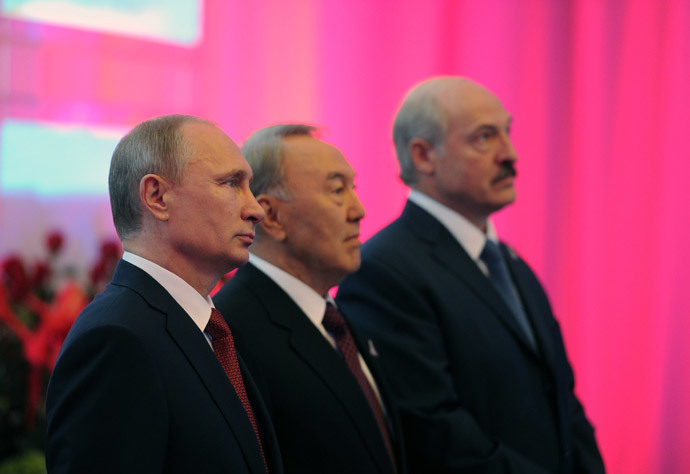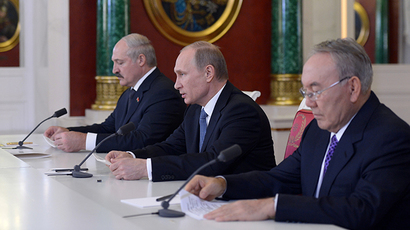Russia, Belarus, Kazakhstan sign ‘epoch' Eurasian Economic Union
Russia, Belarus, and Kazakhstan signed the historic Eurasian Economic Union which will come into effect in January 2015. Cutting down trade barriers and comprising over 170 million people it will be the largest common market in the ex-Soviet sphere.
"The just-signed treaty is of epoch-making, historic importance," Russian President Vladimir Putin said.
The troika of countries will cooperate in energy, industry, agriculture, and transport.
"In fact, we are shaping the largest common market in the CIS, with huge production, scientific and technological potential and enormous natural resources," the President added.
Citizens of Russia, Belarus, and Kazakhstan will have the right to work freely throughout the member states without having to be issued any special work permits, Putin said.
Over the last three years, trade within the Customs Union has increased by $23 billion, or nearly 50 percent. At the end of 2013, it stood at $66.2 billion.
Belarus and Kazakhstan are in third place in foreign trade with the Russian Federation, after the EU and China, Putin said.
The Russian leader said that the document brings Russia, Kazakhstan and Belarus to a new level of integration yes lets each individual state fully retain its sovereignty.
“We ensure a close and coherent economic collaboration and cooperation. Today we have created a powerful and attractive center of economic development, a large regional market that brings together more than 170 people. Our union has huge reserves of natural resources, including energy, which accounts for one fifth of the world’s gas reserves and 15 percent of oil reserves,” Putin said.

"A new geopolitical reality of the 21st century is born,” Kazakh President Nursultan Nazarbayev said shortly after the final treaty was signed by the three leaders.
“We see this as an open space and a new bridge between the growing economies of Europe and Asia,” Nazarbayev added.
David Gray, head of PricewaterhouseCoopers, Russia, said he hoped improving trade will help boost investment, as in the EU.
“If you look at the EU, for example, the reduction of trade barriers within the EU had a significant impact in terms of doing business, which does encourage investment. And I’m looking forward to similar results in terms of the Eurasia deal,” Gray said while speaking to RT at the St. Petersburg Economic Forum on May 24.
However, Kazakh President Nazarbayev warned members to try and avoid repeating the mistakes of the European Union, which is still facing grave economic consequences from the continent-wide recession.
“The point is that none of the participating countries were subject to de-industrialization, and traditional industries did not suffer. Lessons from the European recession are in this,” Nazarbayev said.
Belarusian President Lukashenko hailed the signing, but said there was still major work to be done in areas of bilateral trade.
“We believe the Economic Union will be the foundation for the future of political, military, and humanitarian unity,” he said.
The Customs Union is a project to gather ex-Soviet states into a free trade zone to rival the European Union. The three member states of Russia, Belarus and Kazakhstan only comprise 2.5 percent to the Earth’s population, but account for 15 percent of the total land.
"The geographical position permits us to create transport, logistic routes of not only regional, but also global importance that permits attracting massive trade flows in Europe and Asia," Putin said ahead of the signing ceremony in Astana, Kazakhstan on Thursday.
All member states will retain full state sovereignty. Russia is financing the lion’s share of the administration, but each state will have a one-third voting status.
“The Eurasian Economic Union will operate on universal transparent principles understood by all, including standards and principles of the WTO,” Putin said.

The idea of creating a regional trading bloc was first suggested by President Nursultan Nazabayev of Kazakhstan back in 1994, when he gave a speech at Moscow State University. The Customs Union began on January 1, 2010, and started operating under a comprehensive customs code in July 2011.
Commonwealth Independent States (CIS) like Armenia, Tajikistan, and Kyrgyzstan may be brought into the free trade zone later.
Kyrgyzstan plans to join the Customs Union by the end of 2014, President Almazbek Atambayev said at the meeting.
A decision on Armenia's membership will have to be made by July 2014, Kazakhstan's President Nursultan Nazabayev said.
Commenting on the fact Ukraine once wanted to join, Lukashenko said sooner or later, the country’s leadership will realize “where their happiness lies”, and what is “right for the Ukrainian people.”
“We lost some [potential member states] along the way. Ukraine started this hard work with us, but it was very difficult for Ukraine,” the Belarusian president said.
Neighboring oil-rich Azerbaijan hasn’t made a decisive move towards either the Customs Union or European Union integration.













